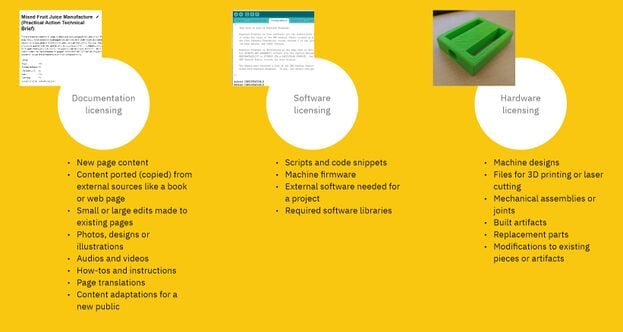
This page describes how Appropedia handles open source hardware licensing.
- Open hardware licenses are applied to all tangible creations on Appropedia.
- The default recommended license applied to all pages on Appropedia is CERN-OHL-S.
- Designs on Appropedia are commonly incremental innovations and thus not patentable. But they can protect the innovation pool of all contributors by preventing others from seeking patents.
These licenses are intended for tangible artifacts, machines, devices, three-dimensional objects that can be physically made or manufactured. These licenses are meant to answer questions related to the creation of tangible objects using documentation, and even the integration of pieces, for example, of parts in a machine that function together.
Open hardware is a concept usually applied to a complex integration of the physical elements, software and documentation, and as such, the licenses specific for the hardware component consider aspects that fall beyond copyright such as restrictions of how these artifacts will be used, or the commercial applications of artifacts reproduced through a piece of documentation. Consider this example: a pizza dough recipe is protected by copyright law, which means that others cannot copy the recipe text without permission. However, copyright cannot restrict anyone from making pizza with pineapple, or from selling any pizza baked using the recipe. This illustrates the need to license machines such as a 3D printer or artifacts such as a 3D-printed bike pedal.
Recommended licenses[edit | edit source]
While there are other good open source licenses out there, Appropedia is an Open Hardware License CERN-OHL-S (strongly reciprocal). In short, this license expects that users are able to use, study, modify, share and distribute any tangible device, ensuring that all derivaties are shared under the same license. Also, please note that non-commercial licenses (such as Creative Commons BY-NC-SA) are not compatible with open source hardware.
Innovation and patents[edit | edit source]
Much of the devices documented on Appropedia are not patentable for various reasons: they are old and well-known in many cases, and focus mainly in incremental innovations, which are usually obvious enough to not be patentable. However, they are valuable for many reasons: they show well-tested solutions and display enough variation to be useful on the field. While there is no guarantee that others will not take advantage of your idea after publishing it, open source can help innovations in different ways:
- Published designs constitute prior art and thus cannot be patentable by others.
- Unlike patents which are country-specific, open sourcing a design should restrict new patents at an international level.
- Unlike a patent, releasing a design as open source has no cost, which makes it accessible to more individuals.
- Open hardware helps support innovation. You can use and reproduce anything on Appropedia, and you can help others do the same.